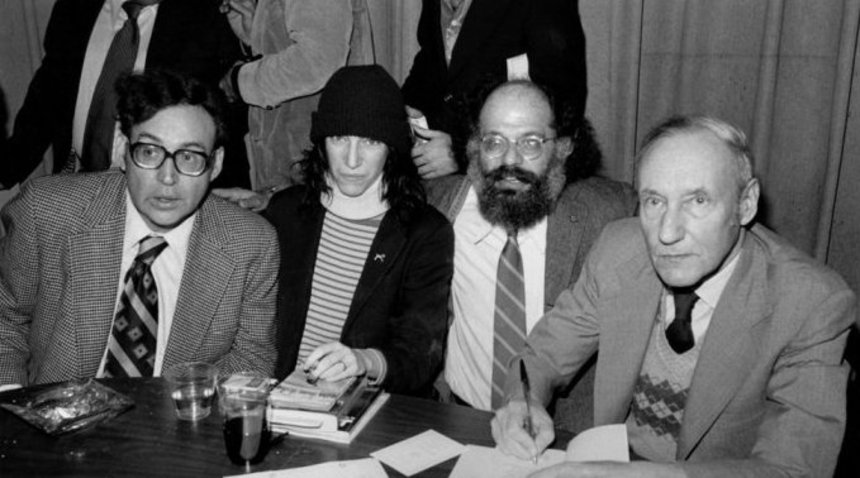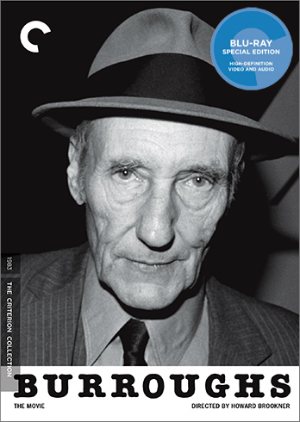Blu-ray Review: Criterion Keeps BURROUGHS: THE MOVIE Alive

Meanwhile, his best friend and NYU classmate, Howard Brookner, was becoming friendly with William S. Burroughs, a neighbourhood crank with a heart, who'd prowl the Lower East Side. There he lived in "the bunker," a large enclosed loft, alive with the howling laughter of great thinkers like Allen Ginsberg and Terry Southern. "What have you been up to?", Southern asks Old Bull Lee in the 1983 documentary, Burroughs. William responds, "Oh you know. I've been giving readings in punk rock clubs."
Brookner's rare friendship was not lost on the ambitious film student, so when Burroughs announced a series of shows entitled The Nova Convention, based on his 1964 novel, Nova Express, featuring guest readings from Patti Smith to Frank Zappa, Brookner did the sensible thing and offered to shoot the convention. Burroughs liked Howard, approved of his hip friend Jim Jarmusch recording sound, and with that, the absolutely priceless documentary Burroughs was born.

From all the photographs and footage of Burroughs floating around, Old Bull Lee always seemed old. Even when Burroughs first began mingling with the soon-to-be-called beats, he was old. He just wasn't as old as he is in Brookner's 1978-82 documentary, or older still in the 1991 Burroughs doc, Commissioner of Sewers.
Brookner was certainly not the first to set his sights on Burroughs as a subject, and he was far from the last, but for all the docs available on Burroughs, Kerouac, Ginsberg, Cassady and the gang -- aside from maybe The Source, which I would recommend -- Burroughs is by and large the best. It's a credit to Howard Brookner, not just as a filmmaker but as a likeable person, to be able to offer Burroughs a comfortable platform for the current state of his voice. In Brookner, Burroughs saw a kid he'd enjoy allowing into his life without altering it in the slightest. Consequently, the audience is treated to 90 real minutes with Burroughs and his friends as they take turns playing raconteur, doctoring memories, and chuckling over muddied myth.
Perhaps the ultimate compliment to Brookner is that for all the pleasure Burroughs takes in muddying myth, and for all the heartbreak incurred during his much sensationalized accidental murder of his one-time wife, Joan Vollmer, via the old William Tell trick -- shooting an apple off the volunteer's head -- Burroughs chooses not to shy away from the subject with Howard when it's eventually broached, as he's done so many times before with previous journalists. In Brookner, William found worthy ears, and it makes for a far more intimate portrait of Burroughs than one who was aware of his reputation would expect. As Jarmusch puts it, "Most docs fail on account of being outside-in. This is inside-out!"
Thankfully, the new Criterion release of Burroughs, which finally makes the film available after 30 years in limbo, is here with more supplements than fans could request. Most of the thanks go to Brookner's nephew, Aaron Brookner, who is the man responsible for unearthing his deceased uncle's film. When dealing with such an old subject, especially one who has ingested as much junk as Burroughs, one might worry about his life span. But Burroughs is somehow made of steel. It's Howard Brookner who would tragically pass at 34 years of age, six years after the release of his film, leaving canisters of treasure shelved for decades. When Aaron Brookner finally resolved to surface his uncle's masterwork, he called Burroughs' former associate and partner, James Grauerholz, who has much screen time in the film, and shared his desire to locate the print. "Aaron", said Grauerholz, "I've been waiting for this call for 30 years."
Apparently the preserved print had been donated to MOMA, where Brookner was able to retrieve and remaster the film. The restoration saw its premiere at the 2014 New York Film Festival. A big thanks also goes to sound recordist Jim Jarmusch, whose presence throughout the Criterion release is alone worth the purchase. Let's have a closer look at this glorious package.

The Supplements
Audio interview with director Howard Brookner
This interview from 1985, conducted by William S. Burroughs' biographer Ted Morgan, makes a particularly enlightening case for the strength of Brookner's rapport with Burroughs. Morgan, who had at that time been spending a lot of time with Burroughs, seems frustrated with the unreliability of his subject's interview. The two swap trade secrets in dealing with Burroughs' trickiness, but when the fragile topic of Joan Vollmer's insane Mexican death story arises, Morgan sounds enviously baffled as to how Brookner solicited a frank telling of Burroughs' tale of love gone dark
New interview with Brookner's nephew, filmmaker Aaron Brookner
It took Aaron Brookner a long time to comprehend the gravity of his uncle's undertaking, but when he finally began to understand what he was sitting on, resurrecting Burroughs became a passion project. In this interview, Brookner walks us through the journey of the print, its restoration, the contributions of those involved, as well as his own relationship with the material and his uncle.
New audio commentary by Jim Jarmusch
Jarmusch begins the commentary by discussing a funny fact about 'Uncle Howard', as he's often referred to, mostly by his nephew, Aaron. He may be Aaron's uncle, but Jarmusch and other friends have been calling Brookner 'Uncle Howard' long before he was actually an uncle. No matter who's speaking, he is Uncle Howard. It's an amusing start to an extremely entertaining and often profound series of musings on what Burroughs means to Jarmusch and how he came into his life. There's also plenty of hysterical production anecdotes like the time when Burroughs and Jarmusch fired guns together. Jarmusch recounts how Burroughs gave him a gun and told him to fire, only when he did, the shot was accompanied by a razor sharp heat that burned his hand. "Ah!", screams Jim. "It burned my hand." Burroughs mouth twitches. "That's why I wear a glove."
A lot of the commentary is Jarmusch just enjoying scenes like Burroughs delighting in weaponry. He laughs when Burroughs retrieves a blackjack. "Classic blackjack", says Old Bill, handling it with knowhow. Even though Burroughs had his time as a crook in his early years, as he recounts to Ginsberg and Southern in the deleted scenes, "he isn't a violent person and certainly not an evil one. He even almost joined the CIA - true story! "He would've been a great CIA agent", says Jarmusch, "but luckily, he's on our side."
Rare outtakes
The extra hour or so provided in the outtake section just goes to show what a rich well Brookner had to draw from when editing. In the deleted sections, we see more of Burroughs returning to his childhood home in St. Louis. There is additional rich footage of Burroughs hanging in New York with friends Allen Ginsberg, Francis Bacon, Terry Southern, Tim Leary, etc., emphasizing how much fun it must have been for Howard to be the fly on such a historically cool wall. The most enjoyable footage comes with the precious expansion of the multi-camera coverage of The Nova Convention, featuring clips of guests Patti Smith, John Cage, Laurie Anderson, Timothy Leary, Ed Saunders, and Frank Zappa. You could also argue it's Burroughs' performance of Dr. Benway, his recurring character from Naked Lunch and Nova Express, as he performs a ghastly operation with the help of Andy Warhol model Jackie Curtis that is the true highlight. Shot in Burroughs' bunker bathroom, Benway's operation via plunger is a bloody affair of Herschell Gordon-Lewis proportions.
Footage from the 2014 New York Film Festival premiere of the film's restoration
I'm grateful to have been present at Burroughs' NYFF restoration premiere, not only because the film is now a favourite, but because it featured an excellent post-film discussion with sound recordist Jim Jarmusch, Aaron Brookner, cinematographer Tom DiCillo, and Burroughs' friend and fellow writer James Grauerholz. All present are grateful for the reunion considering the amount of time passed, not to mention on account of the uniqueness of the production. "I'm not a nostalgic guy", says Jarmusch, "but this was a great time in my life." Jarmusch doesn't believe he was particularly adept at recording sound, but he was grateful as hell to have been there.
Thirty-minute experimental edit of the film from 1981 by inventor and photographer Robert E. Fulton III
This edit of the film isn't particularity good, but it is interesting to see an alternate perspective on the same material. Another perk is that with the contrasting vision comes different footage choices, so there are snippets of discarded scenes to be found within.
PLUS: An essay by critic Luc Sante and collage artwork by artist Alison Mosshart
New, high-definition digital restoration, with uncompressed monaural soundtrack on the Blu-ray
Burroughs: The Movie
Director(s)
- Howard Brookner
Cast
- Mortimer Burroughs
- William S. Burroughs
- Lucien Carr
- Jackie Curtis

Do you feel this content is inappropriate or infringes upon your rights? Click here to report it, or see our DMCA policy.





